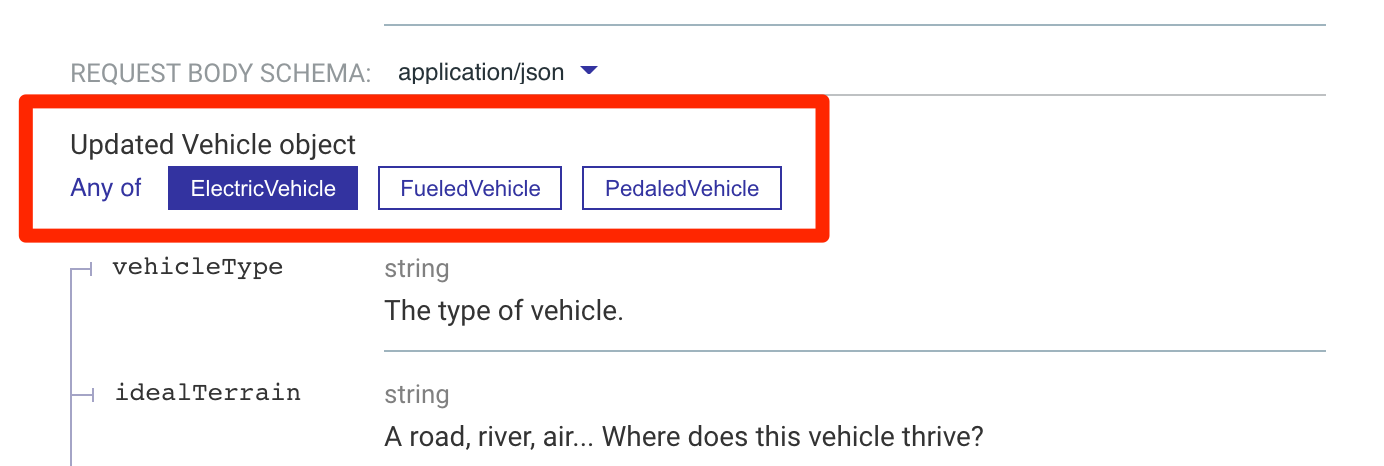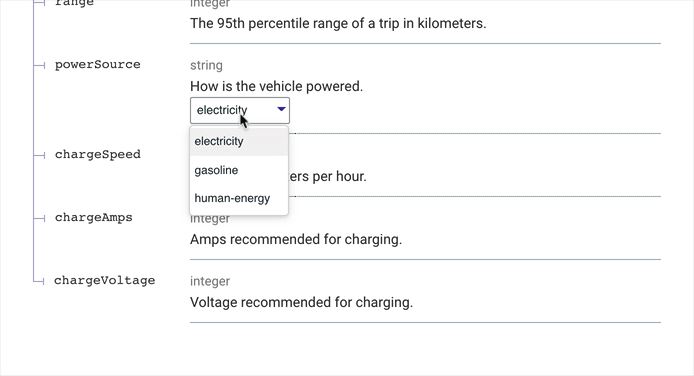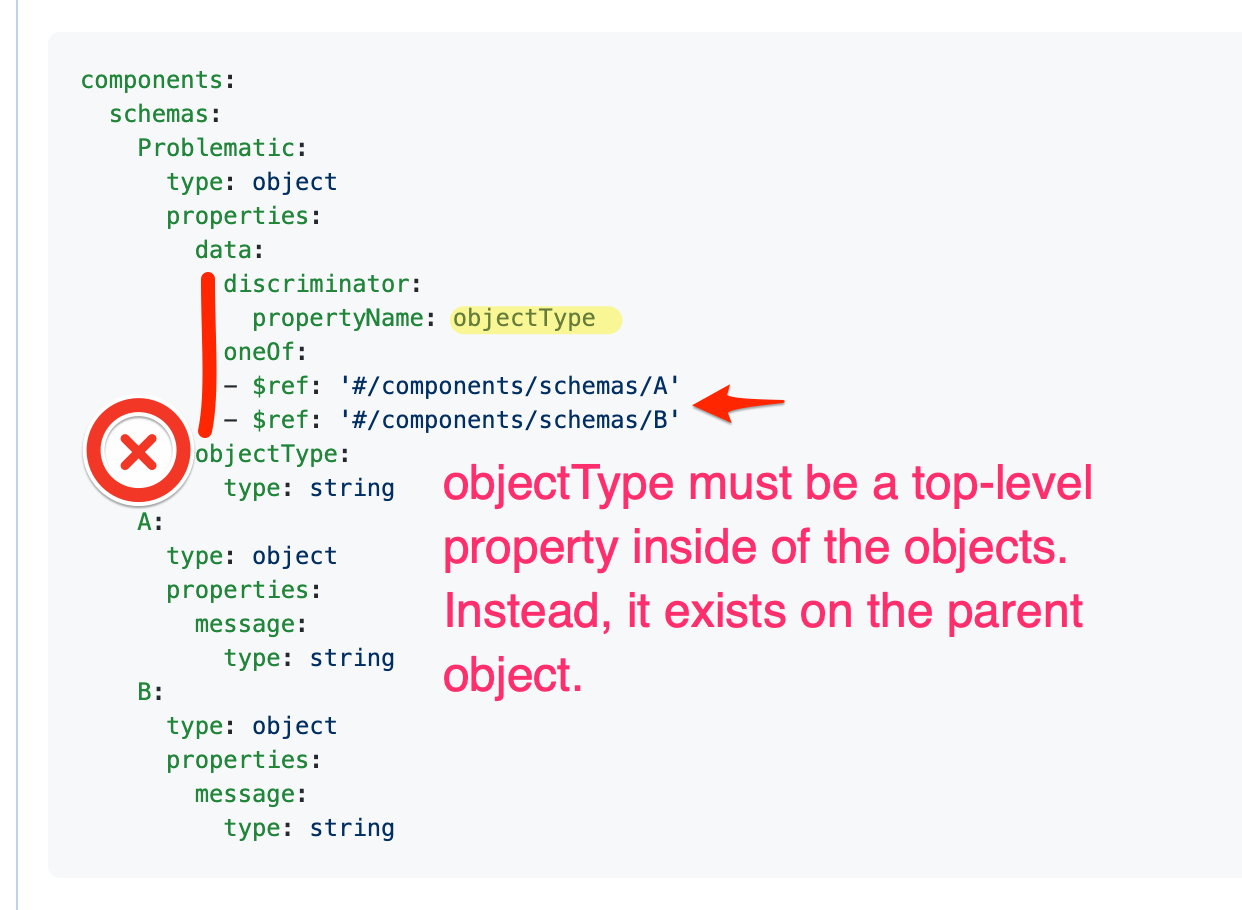How to use the OpenAPI discriminator
When an API can return two or more different types of objects (aka polymorphism), use oneOf or anyOf to describe those schemas (a JSON Schema concept). You might also want to use the discriminator (an OpenAPI concept). But why? And how?
oneOf vs. anyOf
Use anyOf when the item might be valid against more than one of the schemas. Use oneOf when it can only be valid against one of the schemas.
How could it be valid against more than one of the schemas? This is easier than you may initially think. Two schemas with some overlapping properties and no other required properties indicate the need for anyOf.
The examples below with the vehicles would require anyOf to be valid.
oneOf and anyOf are visually presented in our reference docs by choice of buttons.

Control the button labels by defining a title in the corresponding object schema.
type: object title: Gas-powered Vehicle properties: vehicleType: description: The type of vehicle.

When to use the OpenAPI discriminator
Whenever you see the discriminator used, engage in this dialog:
The discriminator adds complexity. Is it necessary?
If the clarity gained by describing the objects distinctly is greater than the cost of the complexity added by doing so, then it may be a good idea to use the discriminator.
It is also possible to create nested discriminators (which involves extra complexity and should be used sparingly).
The discriminator explicitly declares which property you can inspect to determine the object type.
- Electric Vehicle
- Fueled Vehicle
- Pedaled Vehicle
type: object description: Electric Vehicle properties: vehicleType: description: The type of vehicle. type: string example: Tesla idealTerrain: type: string description: A road, river, air... Where does this vehicle thrive? example: roads topSpeed: description: The top speed in kilometers per hour rounded to the nearest integer. type: integer example: 83 range: description: The 95th percentile range of a trip in kilometers. type: integer example: 100 powerSource: description: How is the vehicle powered. type: string example: electricity chargeSpeed: description: In range kilometers per hour. type: integer chargeAmps: description: Amps recommended for charging. type: integer chargeVoltage: description: Voltage recommended for charging. type: integer
The discriminator must apply to the same level of the schema it is declared in (common mistake when using nested objects).
Also, it must be used in combination with anyOf, oneOf, or allOf.
We represent the discriminator like a pull down menu on the discriminated property.
requestBody: content: application/json: schema: discriminator: propertyName: powerSource mapping: electricity: ../components/schemas/ElectricVehicle.yaml gasoline: ../components/schemas/FueledVehicle.yaml human-energy: ../components/schemas/PedaledVehicle.yaml anyOf: - $ref: ../components/schemas/ElectricVehicle.yaml - $ref: ../components/schemas/FueledVehicle.yaml - $ref: ../components/schemas/PedaledVehicle.yaml
In this example the powerSource property must be declared in each of the corresponding schemas.
The mapping is optional and we recommend using it explicitly. If it is not explicitly declared, implicit mapping is introspected from the schema names from the list of schemas included in allOf/anyOf/oneOf including children schema names.
Schema names (including case) must match exactly to the discriminated properties values.
A better alternative is to use the mapping property and making the names explicitly declared. The possible values are determined from introspection by the schema names.

allOf for inheritance
Another common technique used with the discriminator is to define a base schema, and then inherit from it using allOf.
For example, we could have created a base Vehicle schema. Then, each of the specific implementations would "extend" the Vehicle schema using allOf:
- Vehicle.yaml
- PedaledVehicle.yaml
type: object description: Vehicle discriminator: propertyName: powerSource mapping: electricity: ./ElectricVehicle.yaml gasoline: ./FueledVehicle.yaml human-energy: ./PedaledVehicle.yaml properties: vehicleType: description: The type of vehicle. type: string example: bicycle idealTerrain: type: string example: roads powerSource: description: How is the vehicle powered. type: string example: pedaling
Common mistakes
Property outside of the object
The discriminator property name is not inside of the object. This typically causes the object to not be rendered.

Case sensitivity
The discriminator property value is case sensitive (as well as the schema or mapping name).
Discriminator is described inline
The discriminator must use anyOf, oneOf or allOf. When you define it inline, for example, as I did on a version of the ElectricVehicle schema below, it ignores that schema (per the spec):
When using the discriminator, inline schemas will not be considered.
type: object description: Electric Vehicle discriminator: propertyName: powerSource properties: vehicleType: description: The type of vehicle. type: string example: bicycle idealTerrain: type: string description: A road, river, air... Where does this vehicle thrive? example: roads topSpeed: description: The top speed in kilometers per hour rounded to the nearest integer. type: integer example: 83 range: description: The 95th percentile range of a trip in kilometers. type: integer example: 100 powerSource: description: How is the vehicle powered. type: string example: electricity chargeSpeed: description: In range kilometers per hour. type: integer chargeAmps: description: Amps recommended for charging. type: integer chargeVoltage: description: Voltage recommended for charging. type: integer
Catch mistakes early by using our Redocly CLI tool.